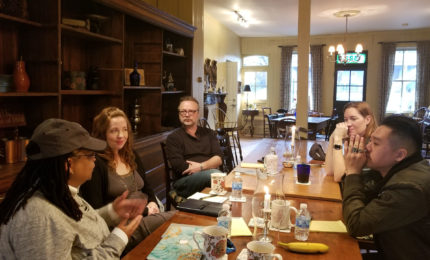Missouri Stories Spotlight with Scott Huebscher
By Grace Smith | June 21, 2023
Scott Huebscher is one of the newest fellows in the Missouri Stories Program, his script “The Importance of Proper Lawn Maintenance” was selected as a winner in 2022. It follows the story of when a depressed man’s 61-year-old mother gets pregnant in a small town, and he grows to a height of 30 feet tall. In addition to his work as a screenwriter, Scott is also an award-winning advertising writer.

Where do you get inspiration for your work?
SH: I only know how to write about things that have happened to me — things I’ve seen, emotions I’ve experienced, places I’ve been, people I’ve met. From there, I put myself in the role of my main character and react to what’s happening in the story as he would.
Tell us about a screenwriter who inspires you and why.
SH: There are just so many, it’s hard to pick one. But today I would say William Broyles Jr. Probably because I watched the movie Cast Away last night, and it is just amazing on so many different levels.
Whenever I stumble across it, I have to watch it. As screenwriters and storytellers, we are taught to write stories to challenge our characters to watch them grow and see what decisions they make — and the premise of Cast Away is just so interesting. At its simplest, it asks “what’s the worst thing that could happen to a man obsessed with time?” And then it drops him somewhere where time doesn’t matter. And writing him as a FedEx employee is just such a brilliant way to show the importance of time to our main character — as well as unlocking interesting scenes throughout the movie; the plane crash, separating packages on the beach, the reunion back home, etc.
Tell us about your writing process.
SH: In a word: backwards. The good news is that I love to write, the bad news is that I hate to outline. I will have an idea for a character and I will start writing scenes. I will write scenes where he meets someone who is the opposite of himself. I will write scenes where someone says no to him. I will write scenes where he doesn’t get what he wants — and it sends him off in a new direction. I will end up with hundreds of scenes, some a half page long, some 10 pages long…
and take stock to see what’s working. Then, somehow take all those broken scenes and attempt to assemble these pages into some kind of semi-coherent order and fill in the blanks with more scenes and characters. And THEN I do an outline to make sure that the stories are tracking and beats are happening in the right places. Please, please, please do not do this. 1/10 would not recommend.
How do you connect with other writers?
SH: When I lived in Los Angeles, I was lucky enough to find a writer’s group of 8 people. Every Tuesday night, we each had to bring 5 pages of a script we were working on — and pass out copies of those 5 pages to everyone in the group, and they would essentially do an impromptu table read. The only rule was that the writer of the 5 pages couldn’t play a part in the reading, they just had to sit back and listen. It taught me a lot about my writing. I found this group by taking a night course on screenwriting at a local college.
How has being a Missouri Stories Fellow affected you?
SH: Well, the fellowship itself was a great experience. To have the luxury to put my day job on hold for a few days to immerse myself in screenwriting and storytelling with other writers who were as passionate as I am was reinvigorating. It got me thinking about my story in new ways and gave my writing a much needed shot of adrenaline. Writing can be a lonely process sometimes. You write for weeks, months, years only to see the project put in a drawer. Then you dust it off, read it, hate what you wrote, rewrite and repeat the process. Being a fellow showed me that all that work wasn’t in vain and gave me a bit of validation to keep going.
What are you up to now?
SH: My fellowship was just a month ago, so I am still running on the adrenaline from it and applying it to the rewriting stage of the process — taking all the great notes and ideas I received and seeing how they work in my script. And I’m just starting to think about what my next script is going to be while quietly wondering to myself if this is the project that I actually do the outline before I start writing scenes.



